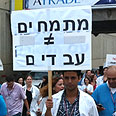
Some 80 medical residents whose previous resignation letters were rejected by the National Labor Court did not show up for work at the Rambam Medical Center in Haifa on Monday. Some 70 residents working at the Tel Aviv Sourasky Medical Center left work after a brief meeting; while residents employed at the Meir Hospital in Kfar Saba and Haifa's Bnai Zion Medical Center also stayed at home.
The residents explained that they had no wish to be employed by the State in light of its conduct and the conduct of the Supreme Court.
Related stories:
- Health crisis: Residents resign
The situation is causing delays in admitting new patients as the residents are responsible for discharging other patients. This results in a shortage of free beds for new patients.
Udi Argaz, one of the residents in Tel Aviv said that the State is reporting false data about his salary. "They demand that I work 10 shifts a week and then claim that I earn NIS 18,000 a month. It doesn’t matter that when I have to work weekends, leaving my family at home on Saturdays, I have to ride the bus to work. Then they say I'm spoiled. I don’t want to work for such employers."

Empty hallways in Meir Medical Center in Kfar Saba (Photo: Neri Brener)
Dr. Niv Marom, a resident at the Meir Medical Center said he failed to show up for work in accordance with a High Court decision allowing residents to resign. "All attempts to bridge the differences did not yield any results. There's no point in waiting for the High Court which will eventually allow us to resign."
The Health Ministry issues a statement saying: "The absence of medical residents following a court hearings, and in light of the National Labor Court ruling, is a disciplinary offence and a contempt of court."
Last weekend, the 14-day period given to the residents, the Treasury and the Medical Association to resolve the labor dispute via negotiations ended. Instead of the "intense dialogue" ordered by Justice Hanan Meltzer, the parties held only three meetings.
On Sunday, the residents received support from specialists who urged them not to show up for work. Justice Meltzer decided to turn over the matter to a High Court panel. Meltzer determined that the limited dialogue had indeed not yielded results.
"A resident wishing to personally resign with no terms relating to his work conditions or their improvement will be allowed to do so," Meltzer ruled. He effectively prohibited collective resignation.
Ahiya Raved contributed to this report
- Receive Ynetnews updates
directly to your desktop















